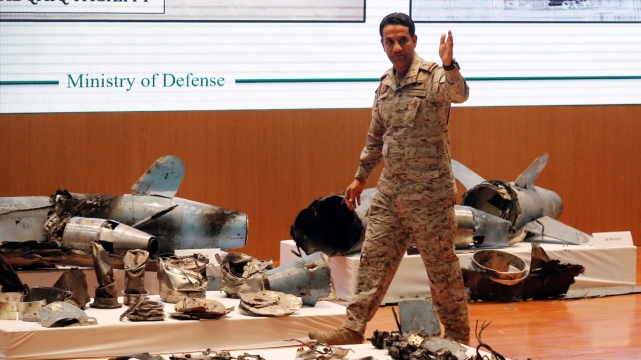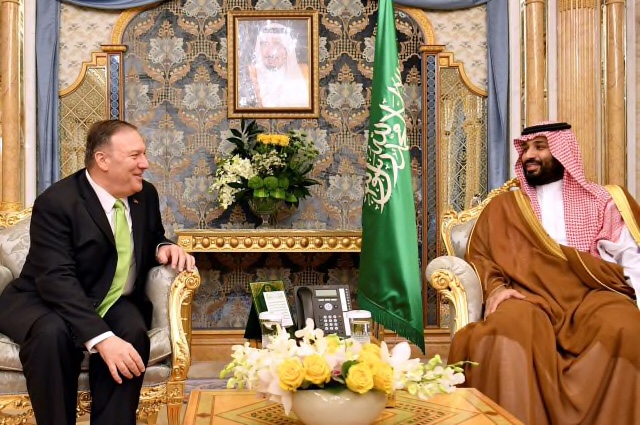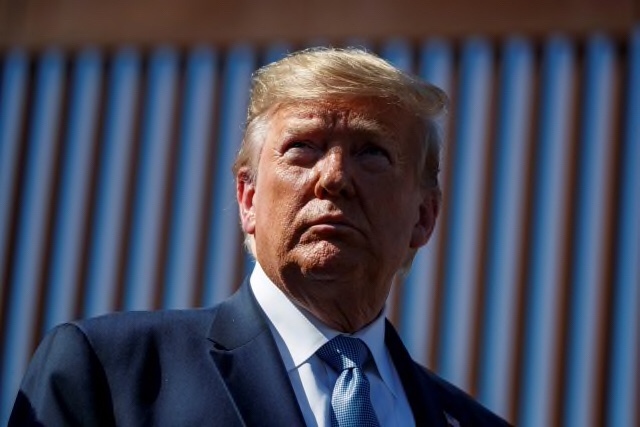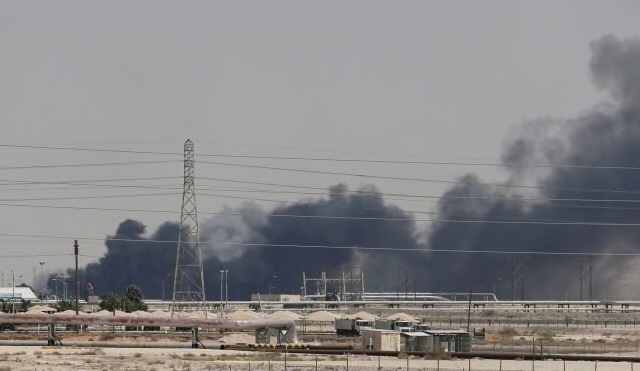
Saudi military spokesman Turki al-Malki displays what he described as an Iranian cruise missile and drones used against Saudi installations, Riyadh, September 18, 2019.Amr Nabil / AP
Analysis The U.S. Has an Excuse to Go to War With Iran. It Just Doesn’t Want To
Trump’s response shows that he doesn’t consider the attack on Saudi oil assets a direct threat on American interests. But a lack of response risks putting Washington and its allies in a bind
Zvi Bar’el21.09.2019 | 22:56
In Israel, Saturday’s attack on Saudi oil installations was pretty quickly defined as “an Iranian attack.” Though such a conclusion serves Israel’s policy of getting Europe to quit the Iranian nuclear agreement, even Israel’s virtual partner, Saudi Arabia, is very hesitant about stating outright that the drones and missiles were launched from Iran.
At a presentation to the media this week, the Saudis displayed parts of the missiles and drones that landed on the large oil field at Abqaiq and more than halved Saudi oil production. The Saudi Defense Ministry spokesman said the fragments show that the missiles and drones were made in Iran. According to him, the angle at which they struck proves they came from the north, not Yemen, though the Saudis are still trying to figure out the exact launch site.
Apparently no intelligence authority is willing or able for now to prove the existence of an Iranian smoking gun. The Houthis in Yemen are sticking to their claim that they launched the weapons, Iran of course is denying any involvement, and U.S. Secretary of State Mike Pompeo has called the attack an “act of war,” an assertion that doesn’t entirely jibe with the Saudi opinion.
On his visit to Saudi Arabia on Wednesday, Pompeo said it was an Iranian attack, but this declaration poses a tough dilemma for Washington and Riyadh. It could obligate Saudi Arabia to go to war or at least significantly react to the attack and thereby become responsible for a conflict that could drag the region into an all-out war, as Iranian Foreign Minister Mohammad Javad Zarif has warned.
At the same time, Saudi Arabia is carefully listening to U.S. President Donald Trump and scrutinizing his tweets that the attack was on Saudi territory and therefore it’s the Saudis who must react. “We don’t need Middle Eastern Oil & Gas,” Trump tweeted.
Oil less of a big deal
This statement raises the question of protecting Middle East oil as an American interest. The 1991 Gulf War, which followed Iraq’s occupation of Kuwait, was heavily based on the argument that Iraqi control of Kuwaiti oil and a possible expansion into Saudi Arabia threatened American interests. Now it appears that oil isn’t necessarily a trigger that would obligate the United States to go to war.

U.S. Secretary of State Mike Pompeo meeting with Saudi Crown Prince Mohammed bin Salman, Jeddah, September 18, 2019. Mandel Ngan / Pool Photo via AP
Trump did write that “we will help our allies!” but he added that he wasn’t promising anything to the Saudis: “There are many options. There’s the ultimate option and there are options a lot less than that.” He noted that he had ordered additional sanctions on Iran without detailing them. Otherwise, “the fact is that the Saudis are going to have a lot of involvement in this if we decide to do something. They’ll be very much involved, and that includes payment. And they understand that fully.”
Trump’s remarks aren’t just a spontaneous reaction, they outline the American strategy for military action against Iran in particular and in the Middle East in general. According to this framework, direct American involvement isn’t automatic. As was made clear to the Saudis, the country that’s attacked will decide on the response and, as necessary, the United States will be willing to help in return for payment.
So the attack has been depicted as a Saudi matter, not harm to an American interest. And Pompeo has suggested that he went to Jeddah to hear from the Saudis on how to proceed; then came Trump’s tweets. This should concern Israel’s decision-makers. Can Israel believe that the United States will see an attack on Israel as direct harm to U.S. security interests, harm that would obligate it to lead a war against Iran or any other aggressor state? Or will it calmly say that this is “an Israeli matter” and it will only be glad to help?
It’s true that Israel’s status in the United States has been different from that of the Saudis, and Prime Minister Benjamin Netanyahu’s close ties with Trump and Congress are far stronger than those of the Saudi crown prince. But Israel has no guarantee of the permanency of its status as an American favorite.
Washington’s conduct regarding Saudi Arabia could well stoke the enthusiasm of those who favor a defense treaty with the United States. Such an agreement could, at least on paper, ensure that America would come to Israel’s aid, but Israel might also find itself in the situation of Turkey, which despite its status as a key NATO member didn’t convince Europe and the United States to go to war on Syria when it was attacked by Kurdish and Syrian forces. Beyond that, a defense treaty with the United States could also restrict Israel if it decides to attack Iran on its own, along with its sporadic attacks on Iranian targets in Syria and Iraq.
An eye-opener in this context is the Twitter correspondence this week between Sen. Lindsey Graham and his close friend Trump. “The measured response by President @realDonaldTrump regarding the shooting down of an American drone was clearly seen by the Iranian regime as a sign of weakness,” Graham wrote. Trump replied: “No Lindsey, it was a sign of strength that some people just don’t understand!” On Wednesday, the president told reporters: “It’s very easy to attack, but if you ask Lindsey, ask him how did going into the Middle East, how did that work out? And how did going into Iraq work out?”

U.S. President Donald Trump touring the border wall at Otay Mesa, California, September 18, 2019. Evan Vucci / AP
With a position like that, it’s hard to imagine that Trump will even encourage Saudi Arabia to attack Iran on its own, for fear that such a response could get Washington entangled in a war that Trump tried to avoid from the outset.
Asymmetrical war
The Saudi caution regarding the discovery of an Iranian smoking gun is understandable given that it could find itself not only without an American military partnership but also in a harsh dispute with its allies in the Gulf. The United Arab Emirates, which has already withdrawn some of its forces from Yemen and has revived its commercial ties with Iran, is opposed to any military move that could harm its economy. Kuwait isn’t lining up with Saudi Arabia, Qatar is experiencing a deep split with the kingdom and is in close cooperation with Iran, and no other Arab country has offered the Saudis military aid if they decide to go to war with Iran.
But even the absence of a response puts Saudi Arabia and the United States in a difficult position. The attack, whether it was carried out by and from Iran or by Shi’ite militias in Iraq or by the Houthis, makes perfectly clear the military challenge facing anyone who decides to attack Iran. Though Tehran doesn’t have a significant air force or naval and ground forces capable of tackling American forces, it can hit strategic targets like oil installations, military bases, oil tankers and naval vessels, and can conduct an asymmetrical and not very expensive war of attrition over a long period.
Thus it’s a lot harder to assess how Iran intends to achieve its ambition to have the sanctions against it lifted via tactical and strategic attacks that could unite the European Union countries and the United States against it. Iran has refused France’s proposal to lend it 15 billion euros to address the economic crisis until a diplomatic solution is found. Iranian Supreme Leader Ali Khamenei and President Hassan Rohani have also announced that there will be no talks with the United States as long as the sanctions are in force. The planning for a meeting between Trump and Rohani at the UN General Assembly this month has also been scuttled by Iran.

Smoke billowing at an Aramco facility in the eastern city of Abqaiq, Saudi Arabia, September 14, 2019. Stringer / Reuters
At the same time, Iran has announced that it will continue to decrease its commitment to the nuclear agreement. Though it hasn’t specified what its moves will be, it’s likely to reach a point where all the allies will have to join the sanctions, and in the worst case, even attack Iran’s nuclear installations. Is Iran reading the diplomatic and political map incorrectly, or is it a prisoner of a narrative that cultivates a defiant stance against “the traitor states,” along with a tremendous sense of national fervor based on the belief that the whole world is against it?
This narrati
The result is a simplistic Western – mainly American and Israeli – narrative that’sve runs like a scarlet thread through the declarations by Iran’s leaders over the years and the opinion pieces in its media. But this narrative is almost totally absent from Western analyses and position papers, especially government ones, on the proper Iran strategy. These assessments focus on Tehran’s military capabilities, its outposts in Arab states and its nuclear program. easy to understand and “logical.” It’s the narrative that “explains” Iran and under which Iran policy is crafted. It’s also the narrative that could ignite the next war.
No comments:
Post a Comment